by | Mar 5, 2014 | 01 What's New, Certification
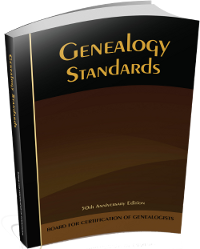 Do you want to become a professional genealogist–or just research like one?
Do you want to become a professional genealogist–or just research like one?
The Board for Certification of Genealogists (BCG) recently released an updated, revised version of Genealogy Standards in honor of its 50th anniversary. It’s a 100-page paperback manual that presents “the standards family historians use to obtain valid results.”
They also just announced that, effective March 3, 2014, the new BCG standards apply to anyone who applies for professional certification or recertification through BCG.
“As the standards are at heart unchanged, genealogists whose work meets the old standards should meet the new standards as well,” states a press release. “The revision, however, means the new standards offer superior guidance as to the qualities necessary for credible genealogical work.”
To help researchers familiarize themselves with the recent changes, BCG has also released two charts that compare the new and old standards. They can be downloaded from the “Skillbuilding” page of BCG’s website.
by Lisa Cooke | Jun 9, 2017 | 01 What's New, British, Records & databases, Scottish Genealogy
Got ancestors from England, Scotland, Wales or Northern Island? Check out these new UK genealogy records online: 1939 Register updates; newspapers; Scottish postal directories and local resources for Derbyshire and the city of York.
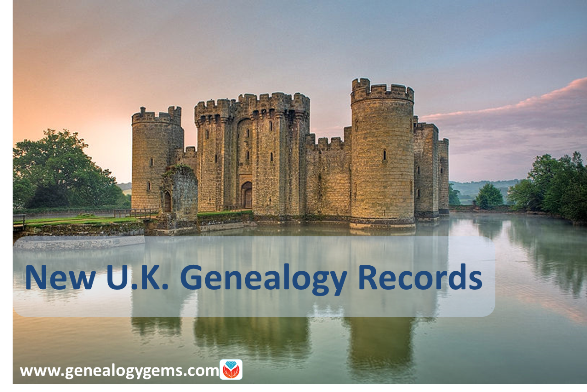
Featured Update: Additions to the 1939 Register online
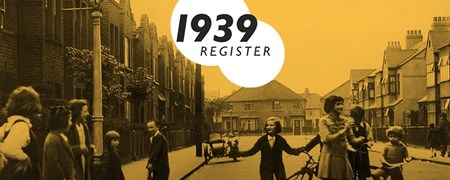 Over 660,000 new records pertaining to empty, uninhabited addresses across England and Wales have been added to Findmypast’s unique and important online 1939 Register resource.
Over 660,000 new records pertaining to empty, uninhabited addresses across England and Wales have been added to Findmypast’s unique and important online 1939 Register resource.
We asked Jim Shaughnessy at Findmypast how these records can help a researcher. “There are a few things that an empty address can tell you,” he responds. “Knowing the house you are looking for was an empty address in 1939 may help you to direct further research. As with other record sets, the occupations of the neighbors can give you an idea of the area (in terms of the largest local employer).”
The ability to search even vacant addresses “can also give you information about areas [later] destroyed by aerial bombing during the War (and during the extensive regeneration in the decades following),” writes Jim. “The Register was compiled September 1939; bombing began in 1940 and a lot of houses wouldn’t have been rebuilt, particularly in impoverished areas where we had bombsites for years and years afterwards. So from that you could look at how the War changed that area or that street: what doesn’t exist now but did pre-Blitz.”
Jim also pointed out that “Findmypast is the only site on which you can search by address on the 1911 census as well as the 1939 register, plus we have the largest collection of electoral rolls, also searchable by address. You can search by address and then build the entire picture of what your family did.”
More UK Genealogy Records Now Online
U.K. Newspapers
The British Newspaper Archive recently added four new titles: the Willesden Chronicle, published in London and the Warrington Guardian, published in Cheshire; the Dudley Herald [Dudley, West Midlands, England] and the Monitor, and Missionary Chronicle, of the Reformed Presbyterian Church in Ireland [Belfast, Northern Ireland]. The British Newspaper Archive now holds over 19.5 million pages of historic newspapers dating from the early 1700s to the early 2000s!
In addition, Findmypast has added over 186,000 records to its collection, Sussex, Eastbourne Gazette Newspaper Notices. “This indexed collection includes names found in the paper’s family notices section (announcements of births, marriages, and deaths) as well as other reports on events such as divorces, murders, tragedies, shipwrecks, lynchings, and paternity cases. The newspaper reported on stories in Sussex, but also internationally.”
Derbyshire, England. Over 800 records have been added to Findmypast’s unique collection of Derbyshire Hospital Admissions and Deaths 1855-1913. “The collection now contains over 5,000 records taken from two different sources: Derbyshire Royal Infirmary, Deaths 1892 – 1912 and Victoria Memorial Cottage Hospital, Ashbourne Admissions 1899 – 1913,” states an announcement. “Each record includes a transcript produced by the Ancestral Archives of Derbyshire. Records can include the patient’s admission date, reason for admission, condition after admission, marital status, residence, rank or profession, date of discharge or death, and cause of death.” Looking for other Derbyshire ancestors? Click here to read about online Methodist records for Derbyshire.
York, England. A new Findmypast resource, The York Collection, includes nearly 300,000 genealogical records documenting over 600 years of residents of the city of York. A press release calls it “the largest online repository of historic City of York records in the world….Fully searchable transcripts of each original document are also included, enabling anyone to go online and search for their York ancestors by name, location, and date.”
The collection is comprised of a variety of fascinating documents, including hearth & window tax records (1665-1778); lists of apprentices and freemen (1272-1930); city of York trade directories; electoral registers (1832-1932), city of York school admission registers; city of York deeds registers (1718-1866); city of York militia & muster rolls (1509-1829), and city of York calendars of prisoners (1739-1851). This collection was published in partnership with Explore York.
Scotland Directories
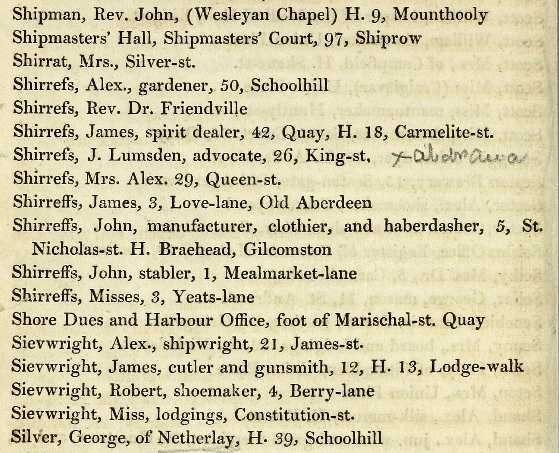
A snippet from an 1820s post office directory for Aberdeen and vicinity. Image on Findmypast.com.
Over 180,000 new record images have been added to Findmypast.com’s collection of Scottish post office directories, now spanning 1774-1942. The collection has nearly 900 browse-only volumes of directories that offer descriptions of Scottish towns along with lists of residents by occupation and address.
Here’s a little background from Findmypast: “Post directories are an excellent source for family historians wanting to trace ancestors on a yearly basis. Directories allow you to fill in the gaps between the census records. They can also provide vital information about your ancestor’s residence, which can lead to the discovery of more records….Directories can add historical context to your ancestor’s story. Directories will give you a better understanding of where your ancestor lived, such as how many businesses were in the town, how many schools, what day was the market day, and how big was the town.”
“Directories may focus on a particular town or district or you can find national postal directories. The majority of post directories comprise a description of the place, along with lists of people by occupation. For example, you will find lists of magistrates, councillors, sheriffs, police officers, and merchants. It is important to remember that post directories are not complete lists of all the residents in the town or county. Also, many directories fail to include women.”
TIP: A browse-only collection of digitized Scottish post office directories for 1773-1991 is available to search for free online at the National Library of Scotland.
Start researching your English ancestors with this free two-part article series:
 British Research for Beginners (“English” v. “British” and more)
British Research for Beginners (“English” v. “British” and more)
English Parish Records: Finding English Ancestors Before 1837
by Lisa Cooke | Aug 16, 2011 |
The Genealogy Gems Podcast Episodes
2011 Season Six
Episode 101 Listen & Show Notes
Tons of great gems in the news, and learn all about becoming a certified genealogist from Alvie Davidson.
Episode 102 Listen & Show Notes
Genealogy Gems News, Updating your Podcast iGoogle Gadget, Research Strategies and an interview with Kendall Wilcox, Executive Producer of The Generations Project about the new Season 2.
Episode 103 Listen & Show Notes
Genealogy Gems News, “Cemetery Justice,” the New Google Books, the New Google Earth Version 6.0 for Genealogy.
Episode 104 Listen & Show Notes
Genealogy and Technology Converge. Interview with professional genealogist Kory Meyerink on the 50 most popular family history websites. Geo-Tagging photos with Chris Bair.
Episode 105 Listen & Show Notes
Interview with Josh Taylor of the New England Historic Genealogical Society on RootsTech. Tips for getting the most out of a conference, NARA videos, and free RootsMagic webinars.
Episode 106 Listen & Show Notes
Lisa shares her experience at the Who Do You Think You Are? Live show held recently in London, as well as some her own Cooke ancestry sleuthing. Interview with New Zealand genealogist Jan Gow on how to create your own family history resource library.
Episode 107 Listen & Show Notes
Free Webinars, the 1911 Scotland Census, Fraternal Organizations, and Dick Eastman joins Lisa to talk about Cloud Computing and Computer Security.
Episode 108 Listen & Show Notes
Census Tips and Tricks with Jason Harrison of FamilySearch. Also how to cite sources from Wikipedia, Lisa finds a newspaper article for a listener, and where to start in looking for Germany records.
Episode 109 Listen & Show Notes
The Civil War 150th Anniversary with Mike Litterst of the National Parks Service. Also, the new Jamboree apps, free upcoming webinars, and a tale of a military heros bible finding its way home again.
Episode 110 Listen & Show Notes
Divorce Research: Little White Lies at the Turn of the Century, free webinar, and special guest Maureen Taylor The Photo Detective from the Who Do You Think You Are? Live event in London.
Episode 111 Listen & Show Notes
Military Records: How to find Invalid and Pension files, New Mexican records, and special guest Roger Kershaw of the National Archives UK gives the back ground on the British Home Children from his book New Lives For Old.
Episode 112 Listen & Show Notes
Helping kids embrace family history at the Genealogy Jamboree.
Episode 113 Listen & Show Notes
Family History Writing with author John Paul Godges.
Episode 114 Listen & Show Notes
Online Security, Records Roundup, Genealogy Blogging with Becky Jamison.
Episode 115 Listen & Show Notes
How to Travel to Your Ancestor’s Homeland.
Episode 116 Listen & Show Notes
The Genealogy Gems Podcast recorded live at the Southern California Genealogical Society Jamboree. Special guests: Allison Stacy, Publisher of Family Tree Magazine, and Certified Graphologist Paula Sassi.
Episode 117 Listen & Show Notes
Find out if you should be using “Flourish” in your genealogy research with my guest DearMYRTLE.
Episode 118 Listen & Show Notes
PERSI, Grandmas and Grandpas and Free Transcription Software.
Episode 119 Listen & Show Notes
Prepare for Family History Christmas Gifts, Listener’s Grandparent Terms of Endearment, and 1000Memories.
Episode 120 Listen & Show Notes
Part 1 of Lisa interview with Washington Post editor Steve Luxenberg, author of the riveting true-story book Annie’s Ghost.
by Lisa Cooke | Jan 12, 2013 | 01 What's New, Organization
From Guest Blogger Denise May Levenick, a recent guest on The Genealogy Gems Podcast:
If you are buried under a mountain of genealogical clutter, take note that January is National Organizing Month and a great time to put your Family History Household in order. When Lisa and I chatted for Genealogy Gems Podcast Episode 144, our conversation reminded me that we can all use a little help keeping the paper tiger under control.
This excerpt from my new book How to Archive Family Keepsakes takes a look at practical strategies to help you Break the Paper Habit. I hope it helps you get a start turning your paper mountain into a manageable molehill.
7 Steps Toward a Paperless Genealogy Office
If you are thinking about converting from paper to digital documents, consider the two types of documents you work with — Archive Originals and Working Documents — and take steps to accommodate preservation and efficiency for both.
Aim to minimize paper copies and maximize the efficiency of your computer file system. Minimize confusion by using the same file naming scheme and file folder organization for converted paper files and for new electronic documents.
1. Pick a Start Date. Businesses recognize the value of knowing exactly when they shifted from paper to digital; it’s easier to find things.
Select a meaningful date, if possible, your birthdate, January 1st, Tax Day, anything that will be easy to remember. Begin saving new information as digital documents and filing according to your file scheme. As you have time, work on digitizing past documents.
2. Print Less. Whenever you need keep information, choose to save a digital version instead of printing a copy.
3. Use a Consistent File Naming Scheme. If you’ve been using a computer for any length of time you probably already have a file-naming scheme in place. If not, or if you feel like you need a better system, investigate different options and find one that works for you before beginning a full-scale digital file management program. Find more information on file-naming schemes later in Chapter 13.
4. Purge the Paper — No doubt, you have a considerable amount of paper sitting on your desk right now. Your Digital Birthday is here; how do you handle the paper pile? You have two choices, digitize or purge. Do you really need to keep the paper copy? Is the information readily available online or in a public resource? See How to Archive Family Keepsakes, Chapter 9 for specific strategies on moving toward a paperless office.
5. KISS, Keep It Super Simple — Keep your system easy and intuitive. Don’t be tempted by fancy, hard-to-remember schemes. Develop a workflow that suits your own personal style, and tweak it until it’s nearly effortless.
6. Post a Workflow Cheat Sheet — Post a simple list to remind you of your paper workflow and file-naming scheme. This can be a real timesaver for those of us who research in bits and spurts on weekends and vacations.
7. Celebrate Your Digital Birthday — Every year on the anniversary of your digital switch, evaluate your current system and upgrade if necessary. This is especially important if you use CDs for external storage; CDs deteriorate over time and older formats should be upgraded to remain compatible with new operating systems.
This is also the perfect time to check your Archive Document storage. Look for any sign of mold, mildew, or bug infestation. Air out your closets. Do random spot checks of different file boxes and folders. Schedule any needed preservation or restoration projects.
Listen to Genealogy Gems Podcast Episode 144 to hear Lisa Louise Cooke interview Denise about her new book and share ideas on preserving family keepsakes.
Join the Blog Tour
Join the Blog Book Tour for How to Archive Family Keepsakes January 10-26, 2013 for author interviews, book excerpts, giveaways, and more. Visit the Blog Book Tour Page at The Family Curator for the complete schedule.
Proceeds from the sale of How to Archive Family Keepsakes during the Book Tour will help fund the 2013 Student Genealogy Grant founded in 2010 in honor of Denise’s mother, Suzanne Winsor Freeman.
Blog Book Tour Giveaways
It’s easy to enter to win a free copy of Denise’s new book or one of the weekly giveaway prizes. All you have to do is leave a comment to the Blog Tour Post hosted at one of the official tour blogs. Random winners will also be selected from social media comments on Twitter, FaceBook, and Google+.
Comment on daily Book Blog Tour Post
Tweet the Tour Twitter @FamilyCurator #keepsakebooktour
Share the Tour on FaceBook, Google+, Goodreads.
Each blog tour post comment gives you one chance to win; one entry per post per day, please. Leave a comment at each stop on the blog tour and increase your chances of winning. The lucky names will be announced each Saturday during the tour at The Family Curator.
About the Author
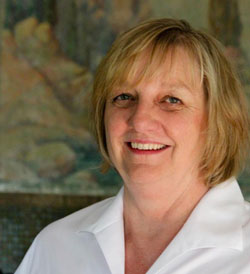 In every family, someone ends up with “the stuff.” Denise May Levenick is a writer, researcher, and speaker with a passion for preserving and sharing family treasures of all kinds. She is the creator of the award-winning family history blog, The Family Curator www.TheFamilyCurator.com and author of the new book How to Archive Family Keepsakes: Learn How to Preserve Family Photos, Memorabilia and Genealogy Records, (Family Tree Books, 2012).
In every family, someone ends up with “the stuff.” Denise May Levenick is a writer, researcher, and speaker with a passion for preserving and sharing family treasures of all kinds. She is the creator of the award-winning family history blog, The Family Curator www.TheFamilyCurator.com and author of the new book How to Archive Family Keepsakes: Learn How to Preserve Family Photos, Memorabilia and Genealogy Records, (Family Tree Books, 2012).
Disclosure: This article contains affiliate links and Genealogy Gems will be compensated if you make a purchase after clicking on these links (at no additional cost to you). Thank you for supporting Genealogy Gems!
by Lisa Cooke | Sep 29, 2016 | 01 What's New, Conferences
Texas State Genealogical Society Conference 2016 is coming up next month and there is still time to register! Learn from some of the elite genealogists in the field, including our own Lisa Louise Cooke.

Pre-Conference Research Day
The Texas State Genealogical Society (TSGS) Conference begins on the 27th of October with the Pre-Conference Research Day. This free research day is being hosted by the Dallas Public Library and the Dallas Genealogical Society.
Held at the Dallas Public Library from 10 am to 8 pm, this research day will include:
- Staff-led tours available of the Genealogy Division (8th floor), the Dallas History & Archives (7th floor), and the Government Documents Division (6th floor);
- Volunteers on hand to assist people with research and Texas Heritage Certificate applications;
- and light refreshments to be served.
The Texas State Genealogical Society Conference 2016
This year’s conference venue will be the beautiful Crowne Plaza in downtown Dallas. You can really get excited for this three-day conference packed with 70 sessions and 35 speakers. The TSGS hopes to provide something for every genealogist. The conference will also include special afternoon breakout sessions and five in-depth workshops among the noted activities. An exhibit hall packed with the latest and greatest from genealogy companies and researchers will be enticing and Genealogy Gems will be there, so don’t forget to stop by and see us!
Lisa’s Sessions at the Conference
Lisa will be presenting a class titled Beginning Evernote for Genealogists on Friday. You will gain a firm grasp of what Evernote can do and how to get started. Best of all, learn how easy it is to put all your genealogical research notes (text, audio, images, etc.) into Evernote and to have it at your fingertips with super fast note retrieval.
On Sunday, Lisa will present Using Google Earth for Genealogy. In this popular class, Lisa (our Google Guru!) will teach you how to unlock the mysteries in your research from unidentified photographs, to how an ancestral location looked a hundred years ago. You will be amazed to discover how Google Earth is one of the best free genealogical tools available today.
Register for the Texas State Genealogical Society Conference 2016
If you haven’t already done so, there is still time to register. Early bird registration is available through October the 7th. See all the price options and register by clicking here: http://www.txsgs.org/conference/registration/
We hope to see many of you there. Don’t forget to stop by and see us in the exhibit hall to share with us what you have learned!
To see where Lisa will be teaching next, see our seminar page here.
More Gems for E vernote
vernote
Get started using Evernote even before Lisa’s class on Oct. 28, 2016. Our quick reference guides make it easy!
Evernote for Windows for Genealogists Guide
Evernote for Mac for Genealogists Guide
 Do you want to become a professional genealogist–or just research like one?
Do you want to become a professional genealogist–or just research like one?







